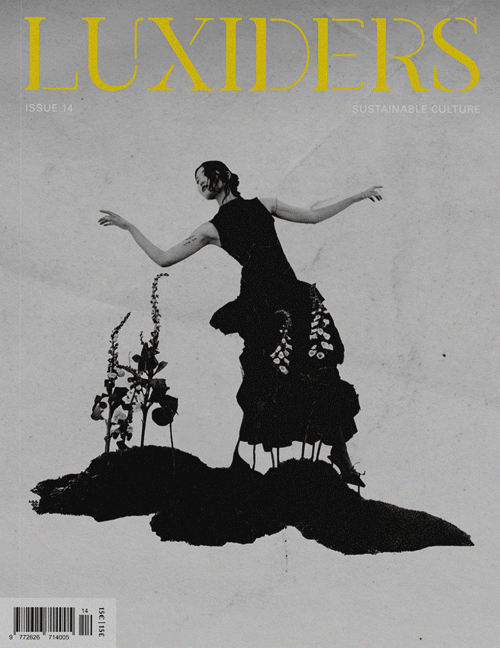
DZHUS “Absolute” Collection | Between Trauma and Avant-Garde Creations
In the haunting interstice between trauma and creation lies DZHUS “Absolute”, a fashion-performance that translates pain into sculptural meaning. For Ukrainian designer Irina Dzhus, this is not just a collection — it is an existential requiem: “patterns into patterns,” grief forged into avant-garde armor. Premiering at Berlin Fashion Week and now dwelling at Warsaw’s Jaga Hupało Space of Creation, “Absolute” is a visual hymn to memory, survival, and unexperienced happiness. Get to know how Irina Dzhus arrived to this state of creativity.
From Survival to Storytelling
Irina Dzhus’s journey into “Absolute” begins in darkness. Having escaped both war and familial abuse, she momentarily found refuge – only to confront her most sacred fears in that familiar safety. She revived her survival mode. The designer harnessed that raw, unfiltered energy and turned it into an urgent creative act: a fashion performance that speaks when music cannot.
At the core of the performance is a cube stage, with a simple chair as the anchor. On this stage Irina becomes narrator, weaving a chain of events, sensations, and dialogues that point toward an agonised pursuit of “absolute” – a happiness she has not yet known. The clothes are memory in motion, looping, mutating, reflecting. The silhouettes are naïvely rigid, referencing modernist comics and spiritual iconography.
Accessories become protagonists: repurposed headpieces, scarves, upcycled challenges – each telling its own micro-story. The technique nods to kintsugi (the Japanese art of repairing with gold), honoring damage instead of hiding it. Anatomical symbolism runs wild: mouths either smoking or ritually stitched; hybrids of deconstructed male face and aged female body; garments that only function while two glove-shapes embrace; a men’s coat embedding an embracing female figure. This semi-supernatural outline becomes inseparable from the artist’s identity – both euphoric dream and paralyzing dystopia.
“I perceive women as an enigmatic, ethereal phenomenon beyond evident logic —yet surprisingly pragmatic, discriminatory, and toxic towards their own kind.” – Irina Dzhus.
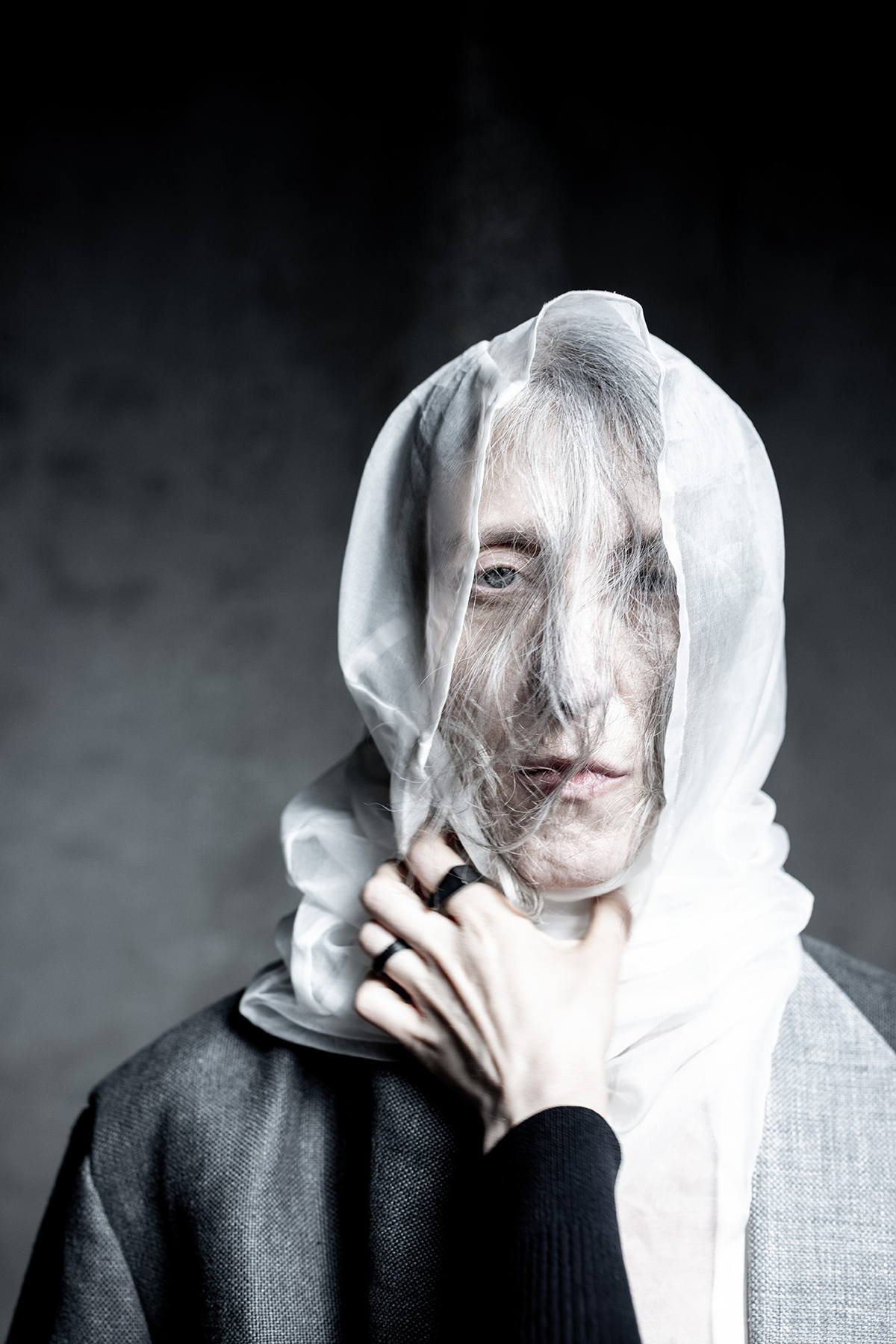
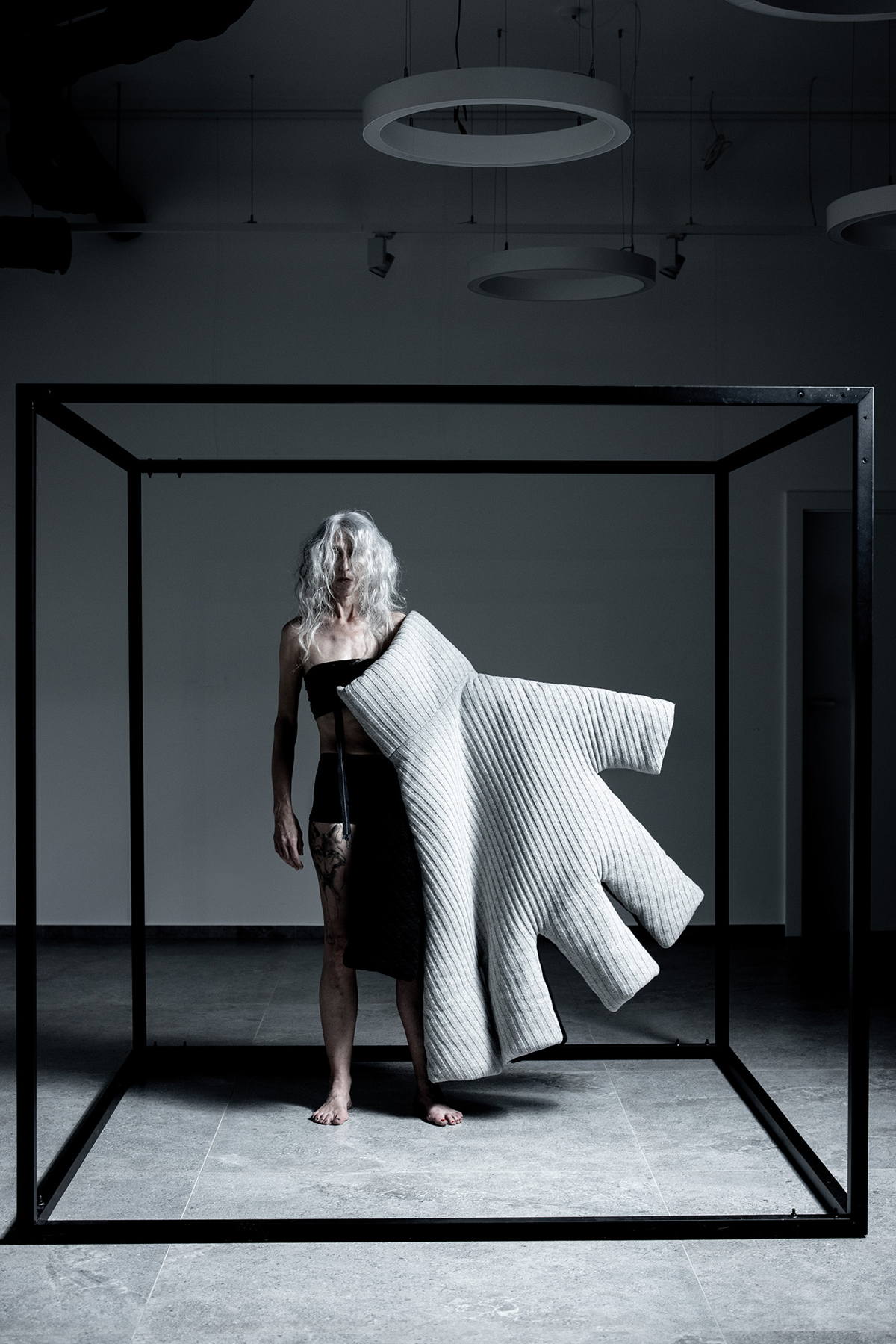
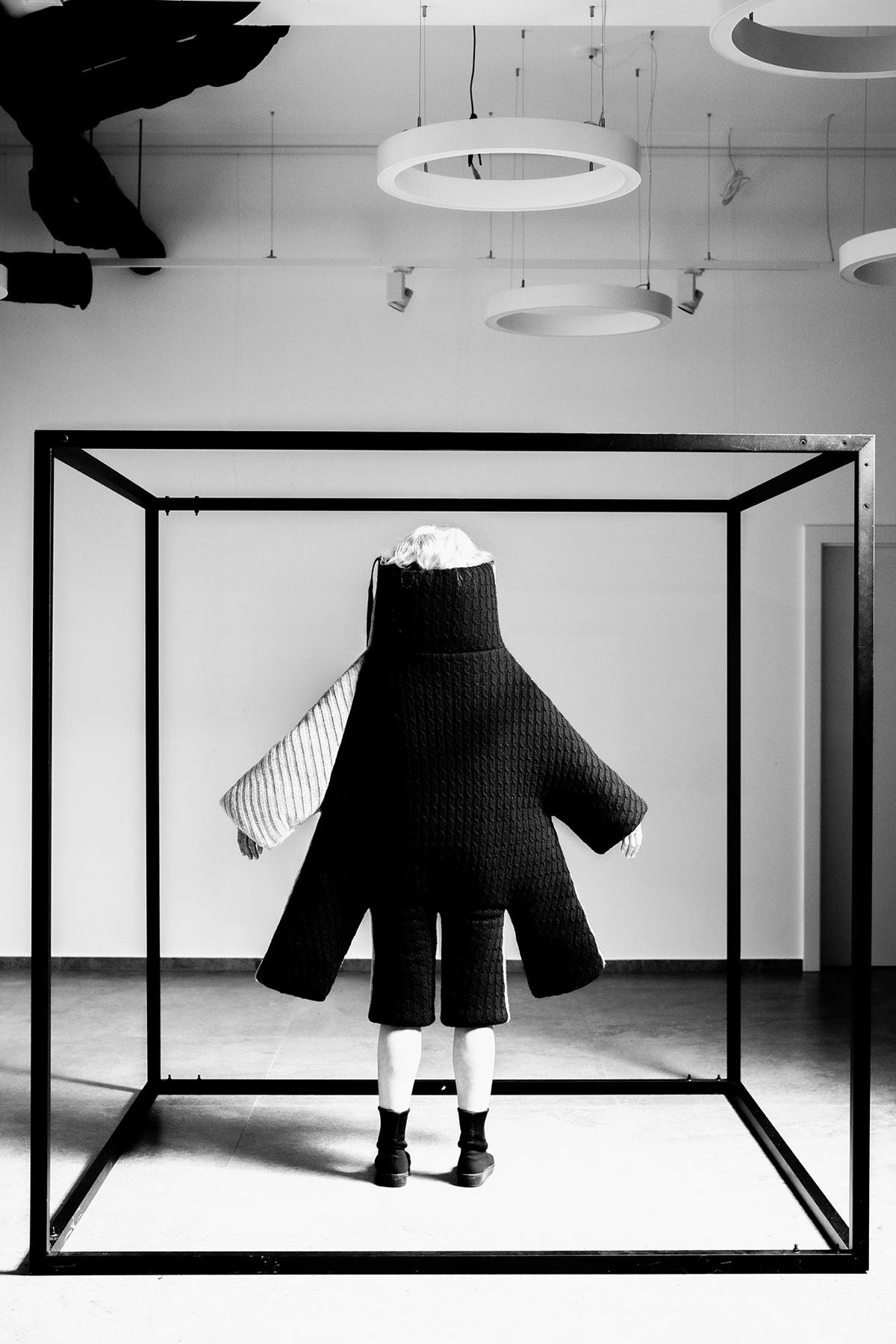

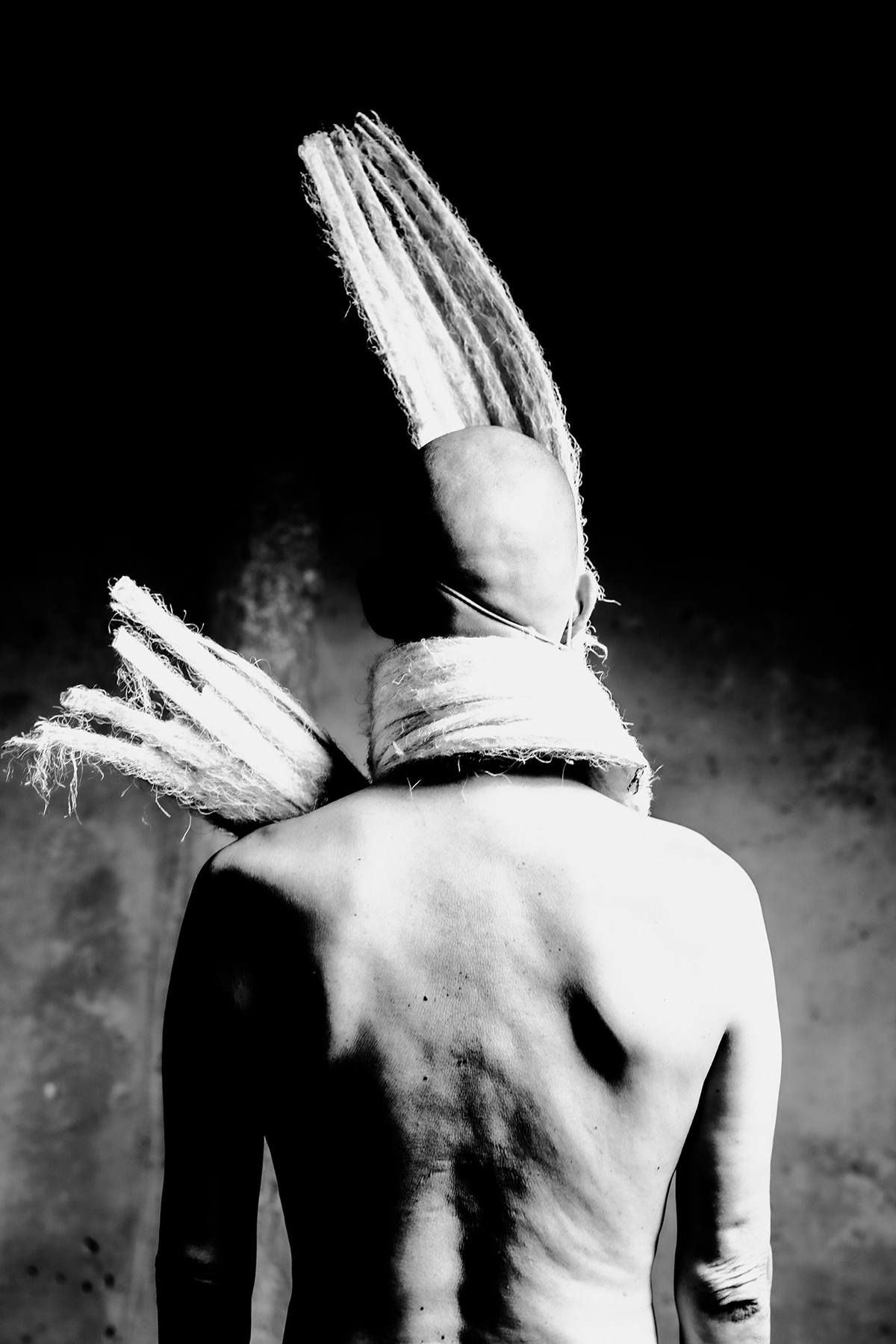
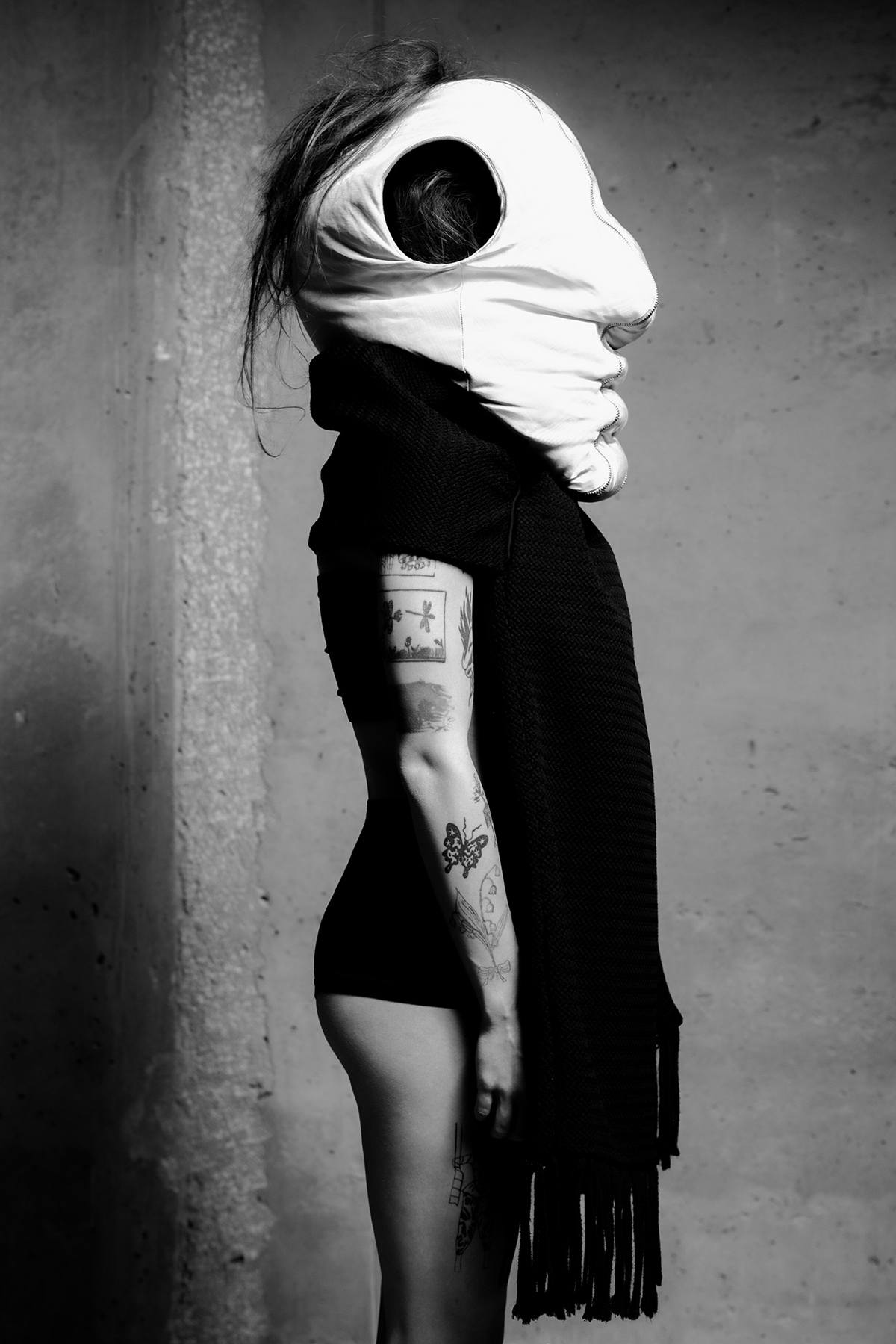
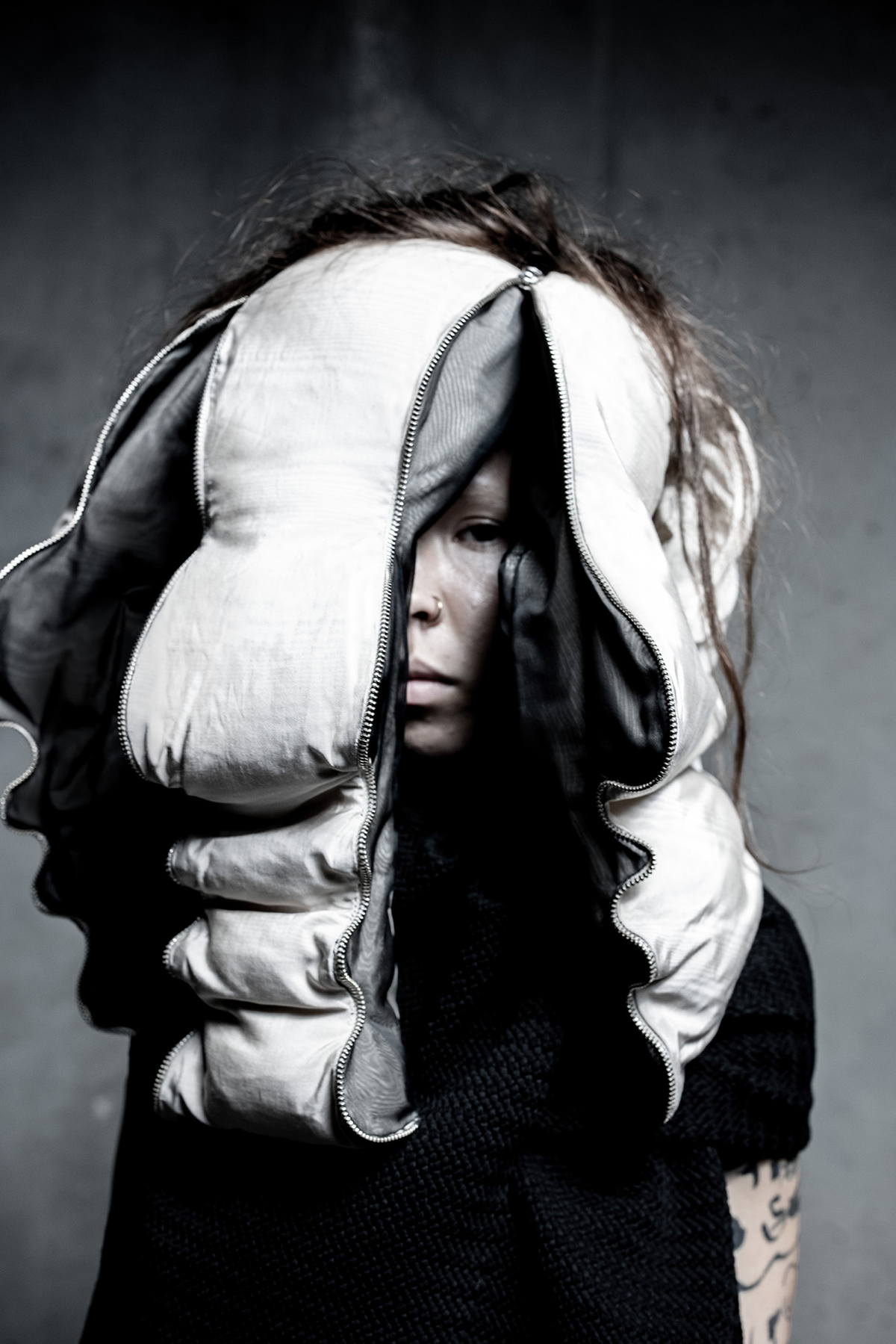
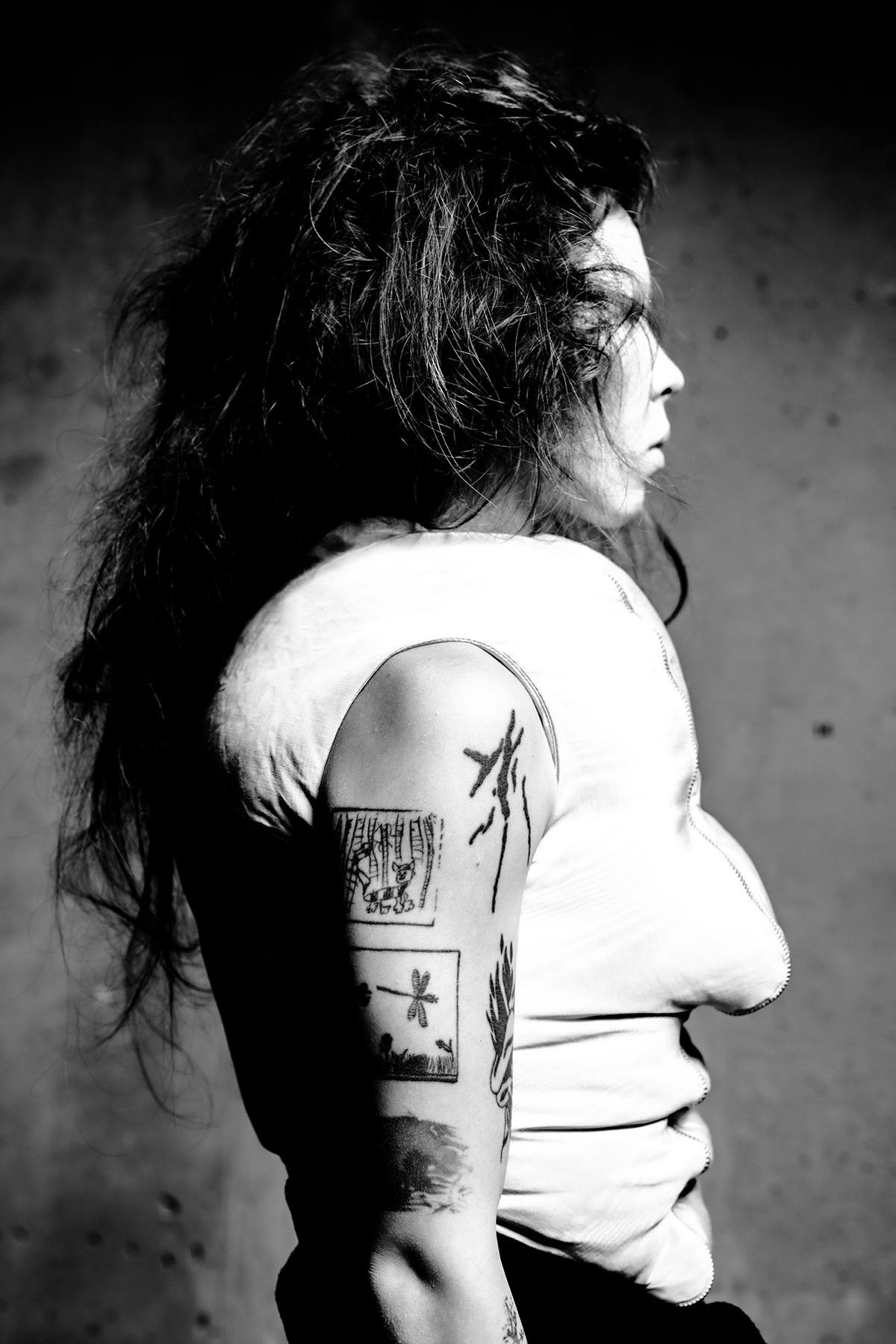
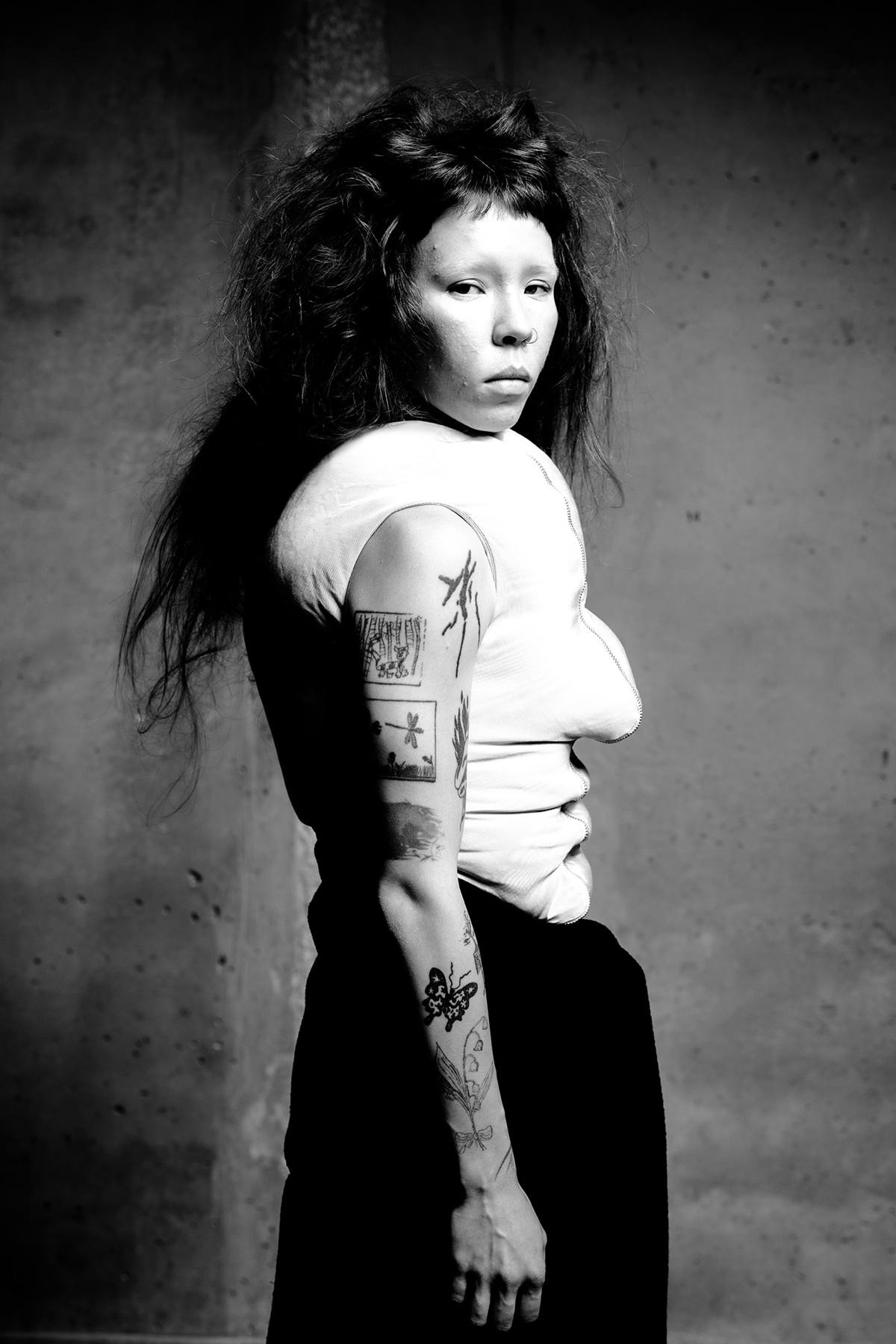

“I was granted with an experience that took away not only my breath but all capability to resist and all compulsions to self-affirm. It was euphorically delightful to be close to someone who embodied an entire universe, and next to whom I could become nothing but a grain of sand, to eventually dissolve into dust.” – Irina Dzhus.
Catharsis, Duty, Freedom | Interview with Irina Dzhus
What personal trauma led you to create “ABSOLUTE”?
Endeavouring to elaborate it once and for all, as a ‘Re:How r u?’ newsletter, I have recorded the 35-minute-long confession I used as my Berlin Fashion Week show soundtrack. Later, the key excerpts accompanied the 8-minute film. Whilst music seemed not applicable, it would either be a shame to leave the peculiar collection imagery unexplained.
Long story short, I found and lost the person of my life. By fulfilling my dream, I took the dream out of my life paradigm, condemning it. Finally, obliged to remain in the physical dimension for a while more, even though my conscience has never coped with the trauma, I had no other choice than to impose the dream back and freeze it until I finish the tasks I’m here for. “ABSOLUTE” is a cathartic ode to someone who, like water in its three hypostases, had been, has become, and will remain a dream as long as I’m supposed to stay animated. Having said that, I prefer to encourage those curious to discover more from the original speech.
How is transforming pain into art?
Felt like an execution. Already uncapable of working in a normal mode due to the unbearable grief, and even cancelled by some employers and collaborators for its vivid impact on my entire attitude, I still had to maintain the brand’s activity and fund the seasonal releases. Thus, I kept applying for the BFW grant and winning it, engaged in generation of collections and shows, one after another. No sponsor would just support my living and random creativity until I return to normal, and the only achievable funding was addressed to particular projects within extreme time frames. This nonstop process has also become an escape from the problem, pausing its resolution. I ended up forced to create and, eventually, to entertain the audience with my pain. I damned this circus, and especially being treated as a joyful and fulfilled eccentric, based on my exaggerated smile and epic movements. In fact, I borrow power for that effort from the heritage of Bharatanatyam: a dance, in which intricate gestures are trained through pain and exhaustion, for the sake of the communicated meanings. Another major inspiration for my establishment has been Dana International. As a child, I admired her determination: if she could discover and cherish her true self, blessing others with her genuine energy, I could try, too. Since these examples aren’t popular enough, think a laughing geisha: is she cheerful? What is her behavioural language driven by and serves for? Now that I have, at last, learnt to opt out of any programmes demanding generation of a completely new product, I look back at how I myself destroyed the remains of my soul and danced on the debris – and I am quite shocked with how cruel a desperate individual can be towards themselves lacking a helping hand by their side.
Freedom as both liberation and duty?
‘No’ to all. Questioning freedom has, actually, been the integral point of my mental research over the last year. The thing is that the common-spread declarations of individual choice as an unconditional value we are bombarded with remain cynical populism until diverse choices are granted with acceptance. The current social agenda is so hopelessly stigmatised that we all end up supposed to target the same existential course. Regardless of our sincere inner needs, we are only encouraged to fight for independence, cultivate our strength, aspire to remain alive, and ideally, be feminist. Neither dogma resonates with me, and imagine how frustrating it, therefore, is, to be forced to pretend and try to fit in even despite a grieving condition, just to avoid a social cancellation that I have already failed to withstand.
Upon a 15-year-long vacuum of a co-parasitic relationship, during which my pride drove me to cultivate such quasi-achievements as independence, empowerment, responsible decisions, and talent fulfilment. Not even a single day had I been happy or even joyful in that indoctrinated continuum. Until I bumped into a chance to set myself astonishingly ‘free from freedom’, which marked my only, by far, happiness moment. I was granted with an experience that took away not only my breath but all capability to resist and all compulsions to self-affirm. It was euphorically delightful to be close to someone who embodied an entire universe, and next to whom I could become nothing but a grain of sand, to eventually dissolve into dust. He sort of withdrew my OCD for a moment and awarded me with a unique chance to entrust my entire self into his hands.
In this regard, and, of course, based on my disturbed childhood, my only comfort zone appeared to be on a margin of self-identification, within an addictive dependence, and free from choice burdens.
Identification-wise, as a nonbinary, I personally have no correlations with womanhood except the sexuality aspect. I perceive women as an enigmatic, ethereal phenomenon beyond the evident logic, yet shockingly pragmatic, discriminative and toxic towards their own kind. My default emotion towards the female factor in everyday life is respectful indulgency, yet the limits of my quiet resistance keep being challenged. I feel alienation from contexts within a female environment, whereas a male company from 15 to 70 is emotionally releasing, be it silly humour or a dispute in quant mechanics.
Returning to sexuality, neurobiology comes inbuilt, making me a curious hybrid of male approaches and female obsessions. My femininity sort of comes relatively, addressed exclusively to a man my heart distinguishes from the entire society, and whose charisma is appealing enough to neutralise the dominant masculinity in my self-identification, hence, in a way, to gently destroy my very self. Then the natural course looks sharply firm and I can only wonder what can make a woman want to resign from being a delicate, fragile entity to be taken care of. Why would I protest against such an exotic privilege in my life? As a 163- cm-tall biological woman, I find it ridiculous to compete with the majestic male physique. Still, in practice, I have to, one way or another, and I bet I do look ridiculous in these attempts. However, these are forced measures I’m not proud of, and which I definitely would not associate with femininity, and would opt out of should I embrace a female role. In other words, grotesque plus aggressive equals minus woman. Need to apply such measures – refrain from shaming womanhood with this hypostasis and pause claiming your femininity until back to cherishing your ‘ethereal meets primordial’ matter.
Another painful topic is duty. From early childhood, throughout my professional integration, and finally, within the wartime reality, I’ve constantly been expected and forced to fulfil my potential, as a conveyer of genial creativity and descent citizenship, with no room or voice for my own desires. Having developed ‘Pavlov dog’ patterns, I struggle to define what I want, unless it’s in-your-face. My brain processes thousands of combinations of all accessible assets nonstop, searching for optimising solutions. When, however, upon a long suffering, with my heart torn away and beating far away, it felt natural to withdraw myself from this hostile realm, not only death appeared to be demonised, but my duties could not let me go either! It was unimaginably sad to realise how many people ‘must’ live instead of ‘wanting to’. In my case, the reasons were prosaic. I am the only child of 2 elderly women, my mother and aunt, whose universe is literally built around me. Secondly, I run DZHUS solely, and until I learn to delegate and develop an inheritance mechanism, I am doomed to serve it.
Summing up, from my current perspective, ‘independence’, ‘freedom’, and ‘duty’ feel like punishment with unbearable responsibility and endless tasks, whereas the ‘liberation’ I aspire for is from choices, and is associated with luxury to exist or not just because I want it so.
Garments as products of emotions?
And the other way round. ‘Emotions as products of garments’ quite conveys my design thinking. Contemporary apparel is missioned to educate and curate, motivate and heal. Generated as a customised formula, it serves to fill in gaps and cheerlead reflections. The right garment is a companion, a pet, a mirror, a diary, an oracle, an admirer, an advisor, and what not. A multipurpose garment brings the connection to the next level, not only responding to a spectrum of conditions but capable of transforming the state of being. After this act of radical self-revelation, what remains? A tiny bit of hope 🙂 Dreams will be dreams.
After this act of radical self-revelation, what remains?
A tiny bit of hope 🙂 Dreams will be dreams.
“I look back at how I myself destroyed the remains of my soul and danced on the debris – and I am quite shocked with how cruel a desperate individual can be towards themselves lacking a helping hand by their side.” – Irina Dzhus.


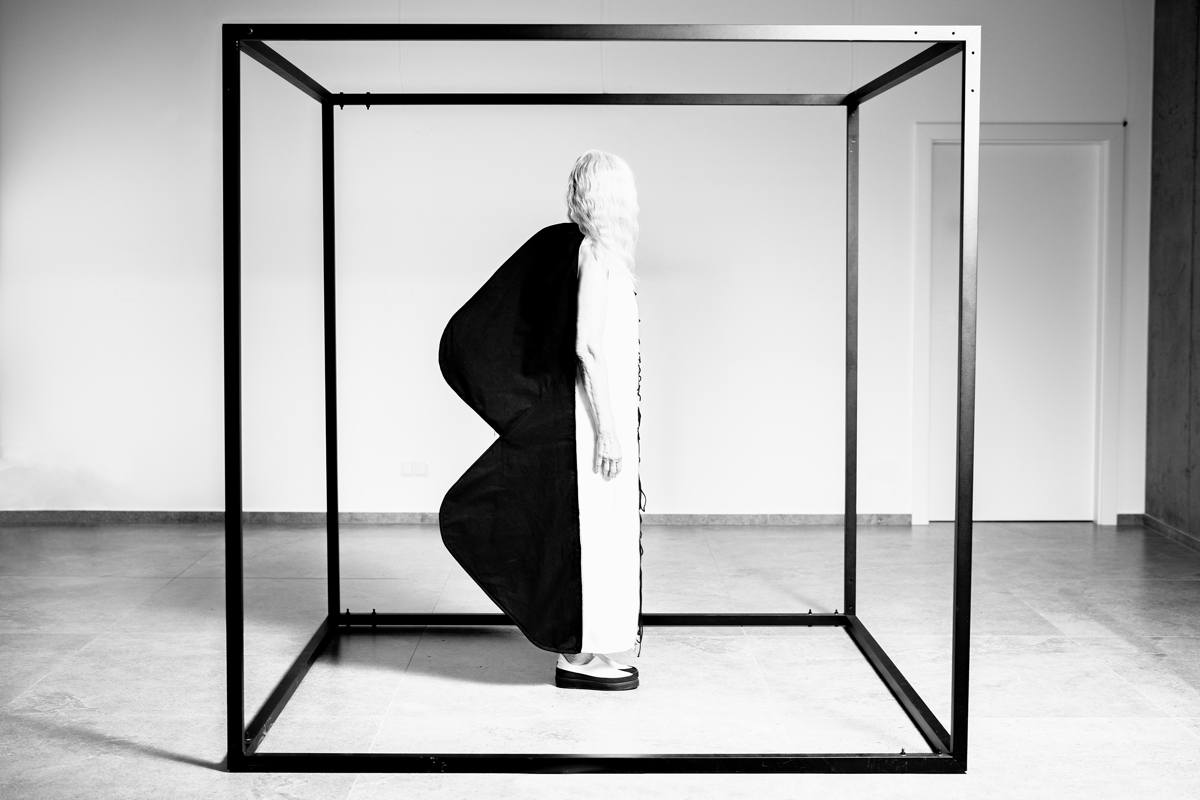

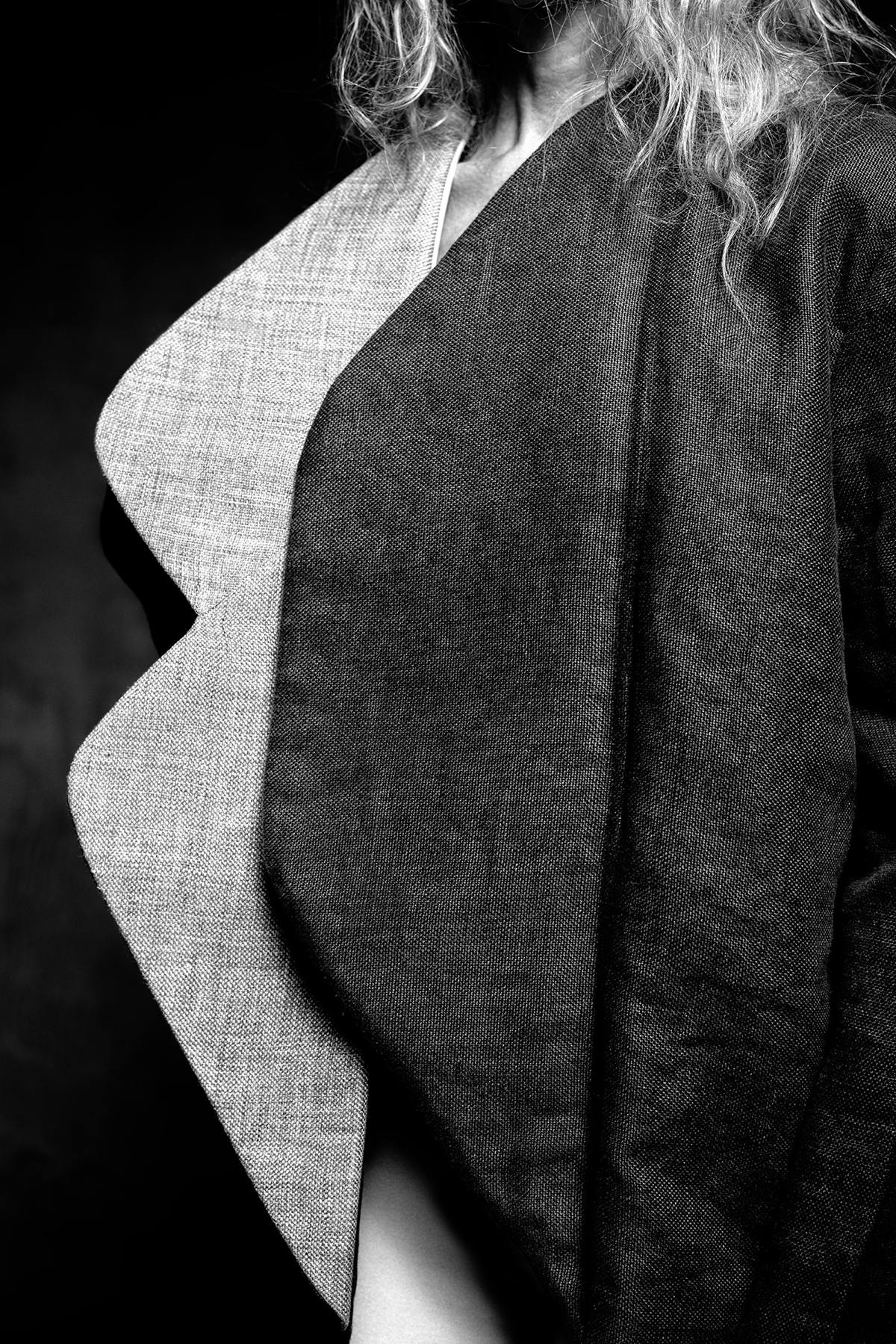
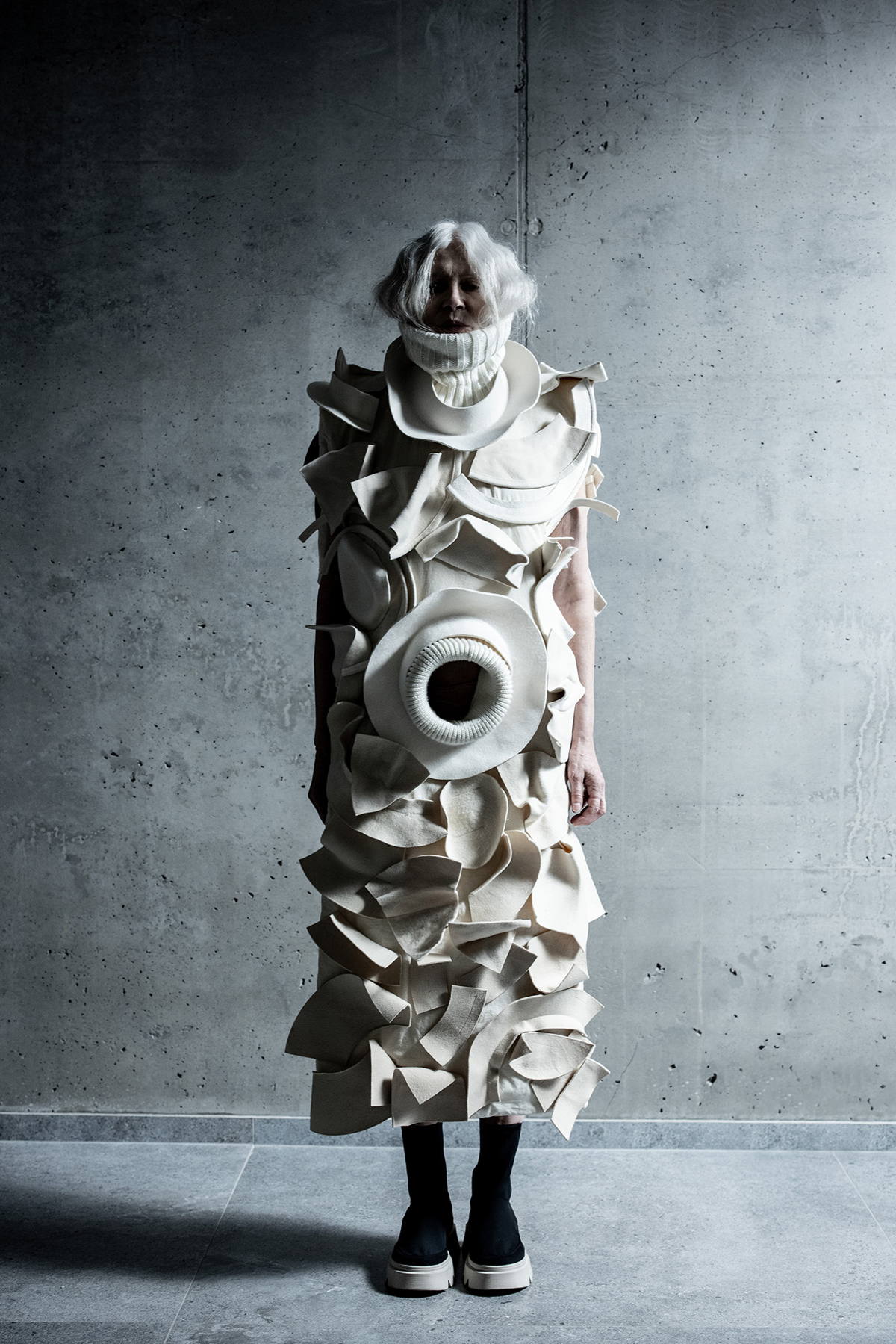
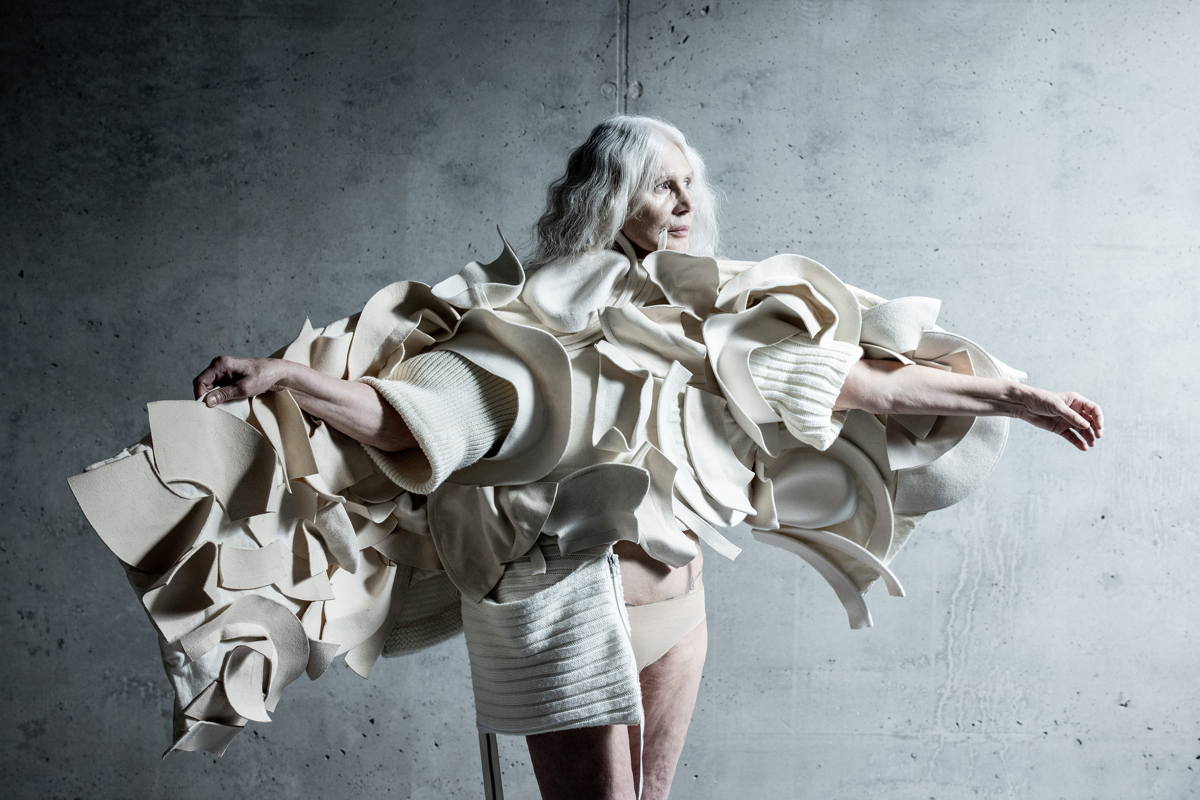


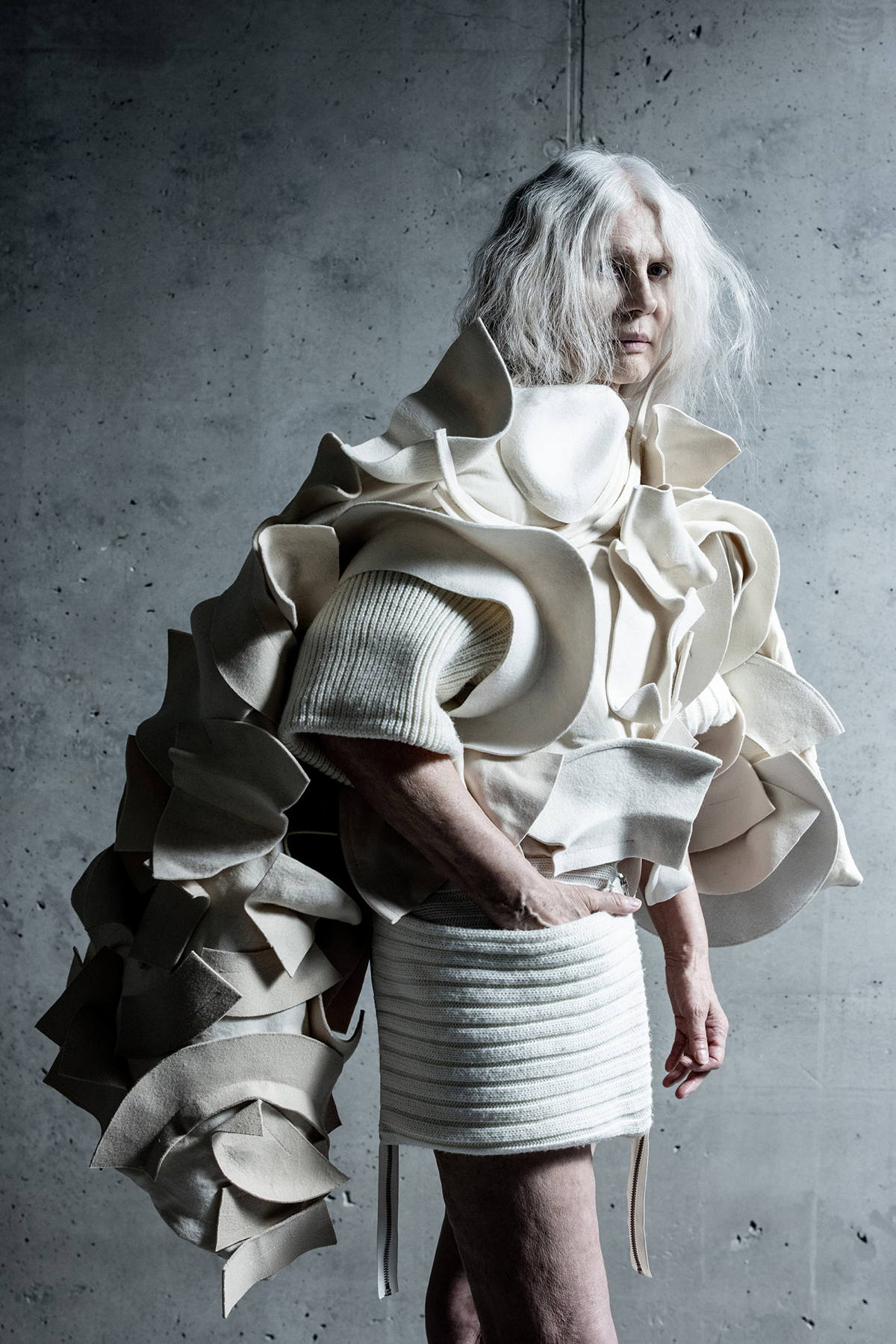

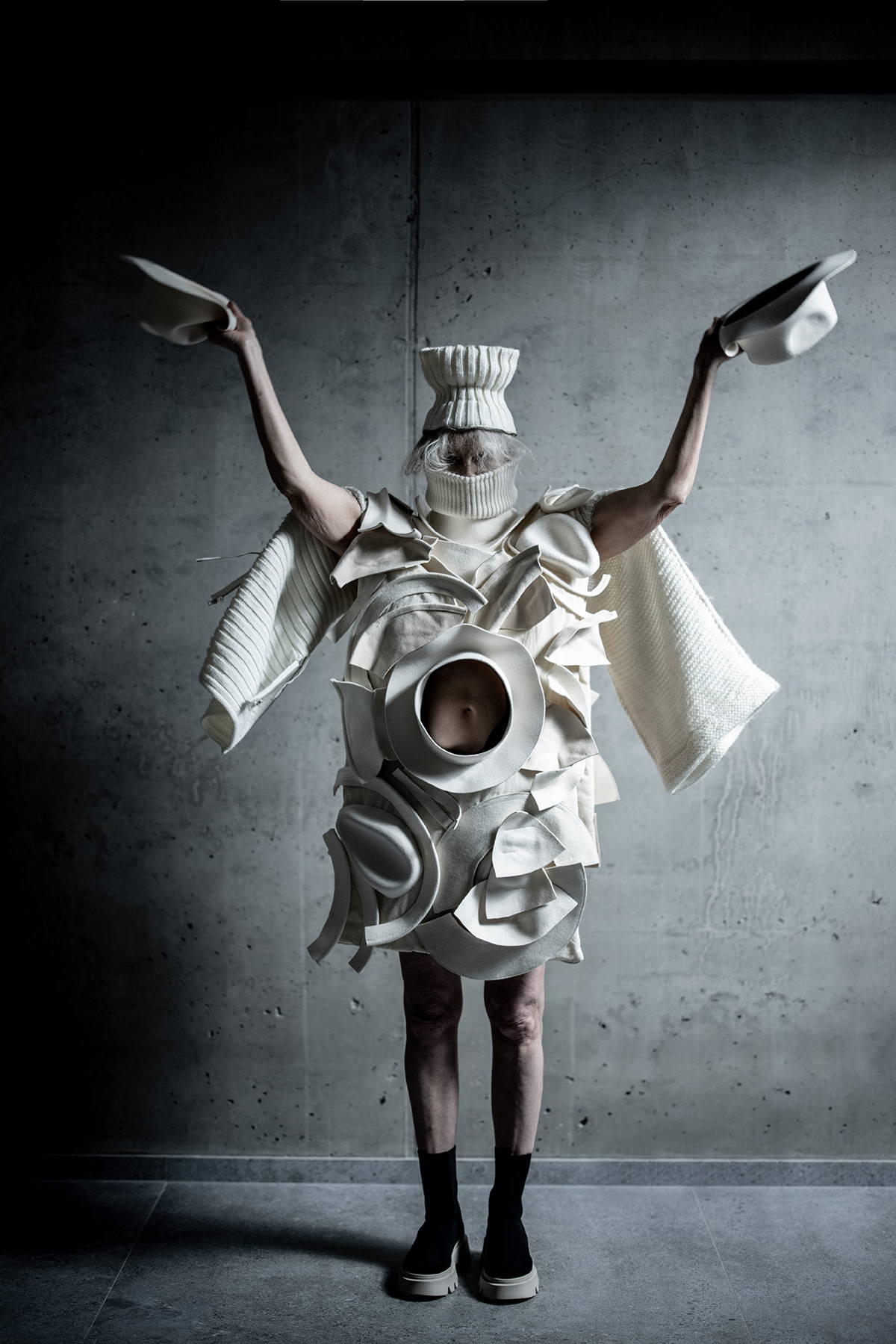
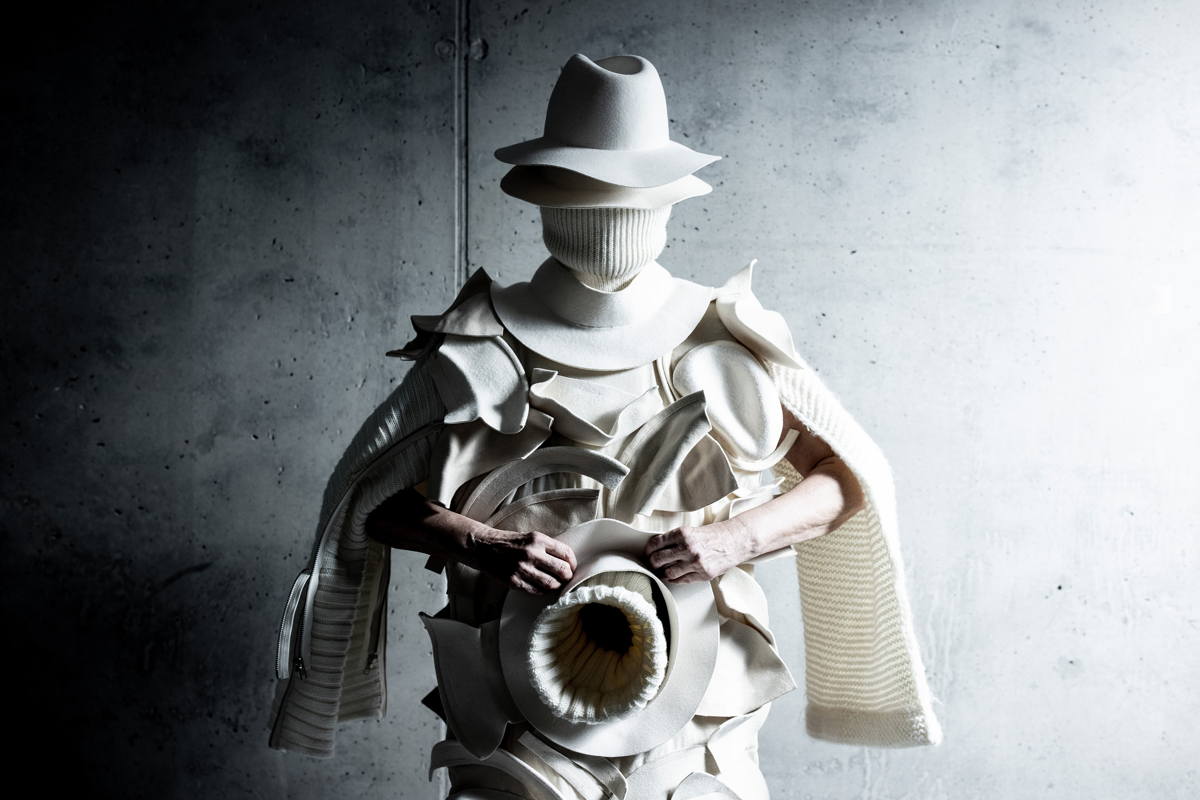
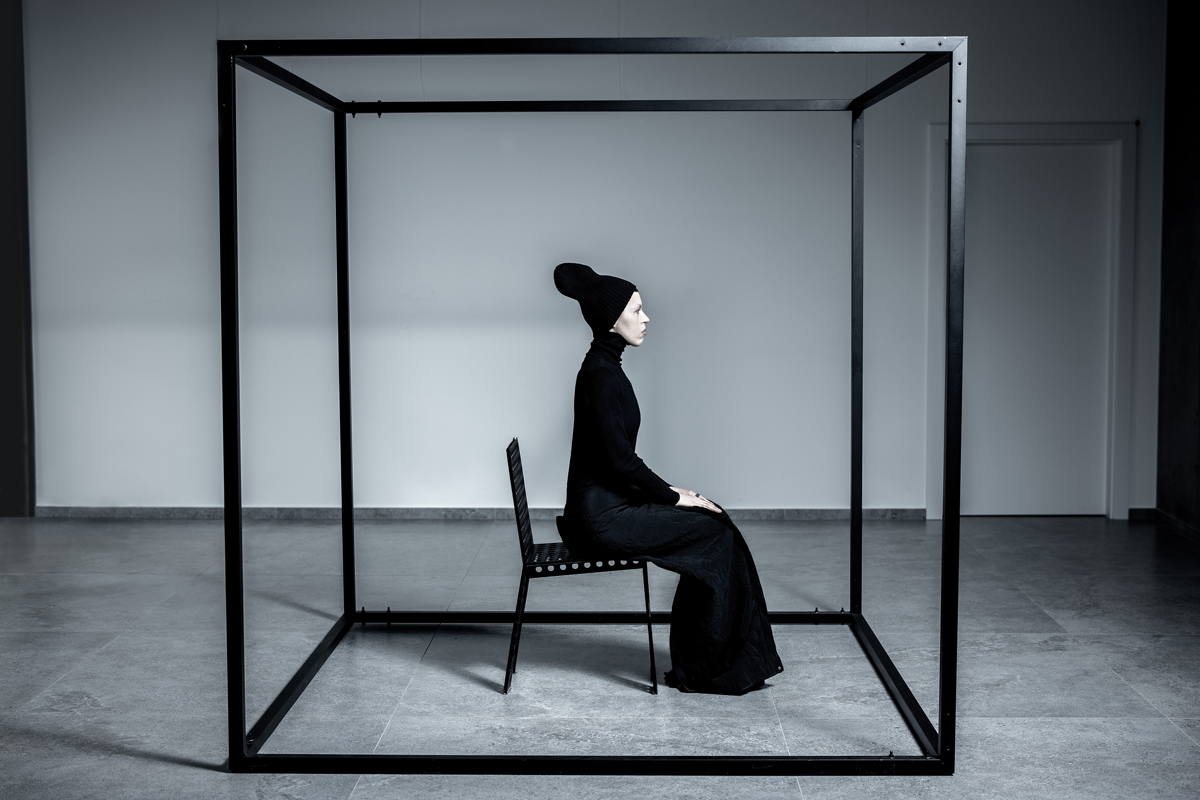
“Absolute” is not merely collection, but concept. The garments are transformable, mutable. Silhouettes evolve, pieces loop back, and the narrative replays in shifting forms. Black, white, nude, ecru tones dominate: color is secondary to texture, structure, and symbology.
The key piece: an oversized men’s coat with an inset silhouette of a woman embracing – a corporeal echo of Irina’s obsessive relationship with her own protagonist. That coat is not just garment, but mirror and emblem.
For Irina Dzhus, “Absolute” is life-defining. From the crucible of sorrow and helplessness, she extracted a rebellious explosion of creativity. She affirmed to herself: no matter how tragic, she will never lose her creative force. This paradox – blessing and doom –, anchors her identity and questions the freedom of choice itself.
Materialized in early 2024, “Absolute” became Dzhus’s cathartic vector. Since then, the brand has built an audiovisual campaign to amplify the message. The project doesn’t just show clothes; it stages a ritual of self-discovery, trauma, and transcendence.
All Images:
© Courtesy Dzhus
